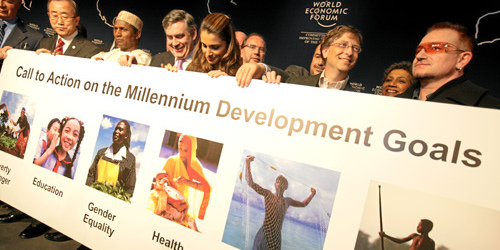
August 8, 2012, by ICCSR
Beyond 2015: Moving Forward on Millennium Development Goals (MDGs)
The role and impact of business in development continues to generate a lot of discussion and debate. At CSR Futures the ICCSR’s 10th Anniversary Conference, a track was dedicated to discuss the contribution of business to the attainment of the Millennium Development Goals (MDGs). Participants in the track were eager to discuss whether business as development stakeholders have kept, and, are keeping to their MDGs promises.
To jog our memories a little, it was in 2000 when the United Nations Member States adopted the Millennium Declaration which committed countries to address and report progress on eight MDGs tracked against 21 targets and 60 indicators addressing:- eradication of extreme poverty and hunger, achieving universal education, promoting gender equality and empower women, reducing child mortality, improving maternal health, combating HIV/AIDS, malaria and other diseases, ensuring environmental sustainability, and developing global partnership for development.
Despite much global progress to achieve the 2015 set global targets, we lag on important goals such as hunger, health, access to safe drinking water, and eradication of extreme poverty. Some countries and regions have reported uneven and, or slow progress.
The MDGs are a good frame of reference to discuss business and development. The presentations were upbeat on the contribution of business to the MDGs with numerous examples shared: for example, partnership in the housing sector in Egypt, leveraging ICT sector in climate change adaptation, integrating water management in Sydney, and the contribution of CSR to MDGs in Mexico. Theoretical papers advancing the creation of proto-institutions and corporate instigated community based organisations to alleviate poverty were also presented.
An underpinning question in all the presentations was the future prospects, opportunities and challenges for business addressing development. It was agreed that despite the contribution of business to MDGs, forces of globalisation, high population growth, dwindling resources continue to impact on how the private sector engages in development, its contribution and role in meeting the Millennium Development Goals. The institutional environment in which business operates either encourages or discourages proactive business behaviour. The negative consequences of business actions was discussed as exacerbating global poverty, climate change, food insecurity, and energy access which are a big set-back on MDG progress.
As the world deliberates on post-2015 development agenda, it was agreed that businesses will continue to act as a key source of sustainable solutions to global challenges. However, with persistent global inequalities including the gaps between the rich and the poor ever increasing, it is no longer business as usual. The private sector must continue to do more and to do better so as to become credible and trustworthy development partners. Sustainable business models must be championed by all but most of all, we need to change the mindsets of many people who still think ‘the business of business is profits’.
It was also agreed that there is need to build on the achievements and replicate success stories where possible. The private sector can intensify its contribution through scalability of inclusive business models. We concluded that for a shared and sustainable future for all, transformational change must begin today and not tomorrow. This necessitates a radical rethink of institutions, systems and processes of global governance for global development. The job has only begun!
By Dr Judy Muthuri, Lecturer in Corporate Social Responsibility, Nottingham University Business School.
Image courtesy of the World Economic Forum
Reproduced under creative commons license CC BY-SA 2.0.
Source: http://www.flickr.com/photos/worldeconomicforum/2218836906/sizes/o/

Can ‘bad business practices’ be tamed through example and awareness raising, or is a change in the law always necessary? It’s a question I put to business leaders at a recent seminar organised by the Chartered Institute of Management Accountants. My question, and their answers, is now available on my YouTube channel:
http://youtu.be/pmA9VCS32Cs (4 minutes)